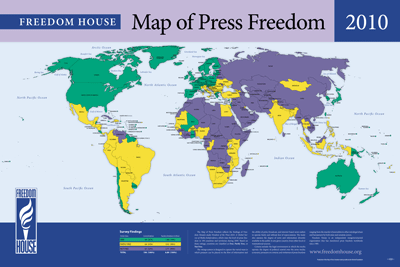Global press freedom declined in 2009, with setbacks registered in almost every region of the world, according to a Freedom House study released today. The study, Freedom of the Press 2010: A Global Survey of Media Independence, reported that press freedom declined for the eighth consecutive year, producing a global landscape in which only one in six people live in countries with a Free press.
Freedom House rates according three categories: legislative environment, political environment and economical environment. According to press freedom status, countries are classified as “Free,” “Partly Free,” or “Not Free” by the Freedom House.
69 out of 196 are among “Free” countries; 64 are “Partly Free” and 63 countries are “Not Free”.
Finland, Iceland, Norway, Denmark, Belgium, Luxembourg, Andorra, Switzerland, Liechtenstein top the rating, they are classified as free. The worst rates (99) have North Korea. There are also three former soviet countries among the world’s 10 worst-rated countries. They are: Belorussia, Turkmenistan and Uzbekistan. In these states, independent media are either nonexistent or barely able to operate, the press acts as a mouthpiece for the regime, citizens’ access to unbiased information is severely limited, and dissent is crushed through imprisonment, torture, and other forms of repression. the Russian Federation is leading in terms of media restriction among former Soviet Union countries. Press is almost completely controlled by the authority. Armenia is on the 146th place (rating 66), Azerbaijan is on the 172nd place (rating 78). Both countries have status of non-free.
As for Georgia, which is halfway between partly free and not free statuses, it differs from its neighbors by the fact that international media is not restricted there. This is how Walker characterizes freedom of media practice in Georgia:
“Media is given middling evaluations in Freedom House analysis. Georgia differs from many of its neighbors, as it has maintained broadcasting – television broadcasting, independent television channels and at the same time it has a wide network of international broadcasters, unlike many of its neighbors that hinder international broadcasters. The situation in Georgia is concerning, but it remains to be the state which presents itself in the sphere much better than other post-soviet countries, minus the Baltic States.
According to the research, freedom of press most evidently declined in central and eastern Europe. The trend was observed in former USSR countries by the report authors, although Baltic States are no longer identified politically with the region.





